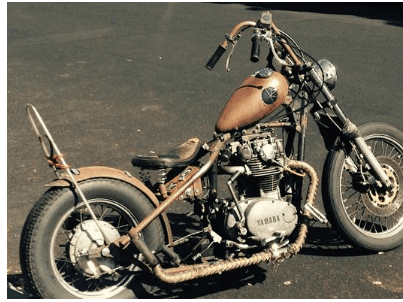USA Motorcycle Mirror Laws
Motorcycle riding is a great pastime, and it’s also an awesome way to get around cost effectively. Countless riders also enjoy being able to express themselves by modifying, upgrading and tuning their bikes.
While you have ample freedom to make changes, there are numerous state laws governing sport and cruiser motorcycle mirrors. Fortunately, this guide breaks it all down.
Making Sense of the Law
Most states don’t have separate mirror laws for motorcycle riders. Instead, they typically group motorcycles in with other forms of road transit and cover them with special sub clauses or paragraphs in their general vehicle codes.
In a few states, like Nebraska, you may lawfully operate a motorcycle without any mirrors at all. [1] Of course, the fact that you can do so legally doesn’t mean that it’s a good idea.
So how do you ensure that you’re on the right side of the law? Although the federal government leaves things up to the states, following the recommendations set by the U.S. National Highway Traffic Safety Administration, or NHTSA, is usually a smart starting point. If your bike meets NHTSA crash avoidance recommendations, it’s a good bet that you’re riding safely and in line with most laws. [2]
Getting Specific
Your modifications or repairs to your bike might make it noncompliant with federal guidelines. Before purchasing or customizing a flashy new ride, it’s wisest to consult with your state’s DMV for specific details.
For instance, a number of states, like California, Colorado, Illinois, Hawaii, Georgia, Florida, Maryland and Washington, mandate that all road-legal vehicles including motorcycles have to be equipped with at least one mirror that gives the driver no less than 200 feet of rear-facing visibility. Other states, like Delaware, Kentucky, Tennessee and Kansas, just require rear-facing mirrors that are properly sized or positioned to give the driver a view of the road behind them. These differences matter in terms of your bike’s legality, so it’s important to know what’s correct for you.
How Many Mirrors Do I Need?
One other common variation in how the laws work from state to state is that different jurisdictions often require different numbers of mirrors or mirror layouts. For instance, some statutes specify that at least one mirror has to be mounted on the left side of the vehicle. Others leave the particulars up in the air.
States like Arizona, Nevada and California demand that riders only operate vehicles that have mirrors on both sides. Once again, the devil’s in the details, so take the time to read up on your requirements.
Do I Need to Upgrade My Vintage Bike?
Nobody likes the prospect of changing a classic motorcycle that they’ve spent blood, sweat and tears maintaining or restoring. Fortunately, you may be able to get away with leaving your throwback model as-is.
The secret to this trick lies in carefully scanning your state’s legal code to identify the specific date ranges that each law applies to. If your vintage ride was manufactured before the mirror regulation went into effect, you might be grandfathered in.
The best way to find out for sure is to reach out to someone at the DMV for help with your situation. Asking about the rules when you register your vehicle can really clear up any confusion. Sending an email for written clarification may provide you with the evidence that you need to get out of a ticket if you’re flagged down by an overzealous officer who might not know the law.
Penalties & Consequences
Finally, bear in mind that your state is likely to be unique in how it treats rule breakers. You may be charged with a misdemeanor or worse for a seemingly small violation. Depending on where you live, this could mean jail time or hefty fines.
So should you install a new doubletake dual sport mirror or other upgrades? It all depends on where you register and ride your bike, and educating yourself is always the first step. Learn your local laws, and check out our other articles for more insights.
[table id=75 /]Sources:
[1] http://www.safenebraska.org/files/7313/9206/9465/Motorcycle_Laws_and_Legal_Requirements.pdf [2] https://www.law.cornell.edu/cfr/text/49/571.111


